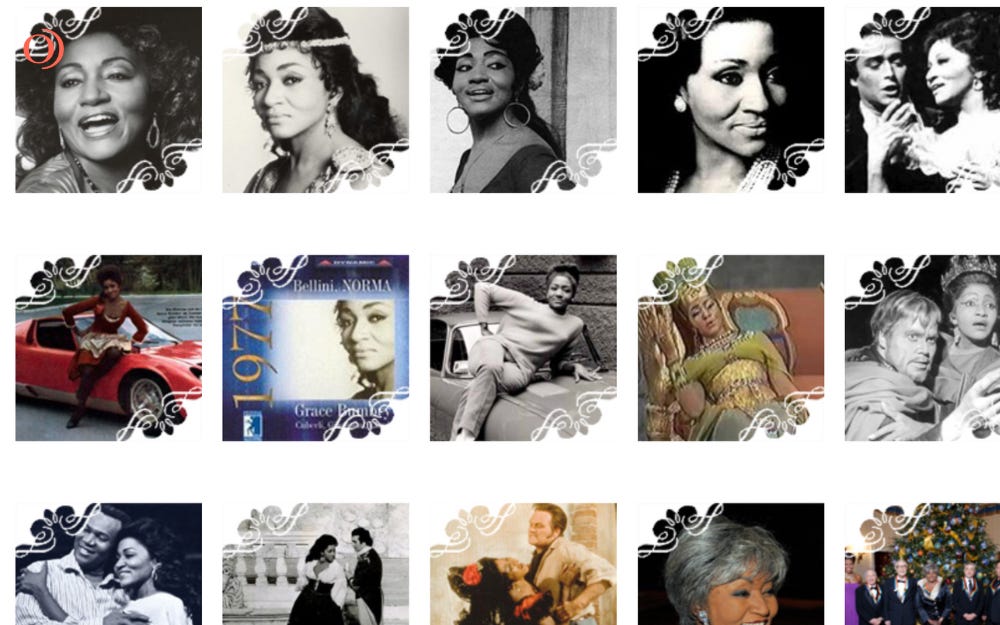Opera Daily 🎶 — Grace Bumbry
This week's Opera Daily features Grace Bumbry, a true legend of opera
👋 Hello to the new Opera Daily subscribers who have joined us this week. I hope you’re sitting on a plushy couch with a warm beverage and enjoying your weekend. You can check out the complete Opera Daily archives and the playlist on YouTube for more selections. If you were forwarded this email by a friend, join us by subscribing here:
On May 7th, the opera world lost a star, Grace Bumbry.
As I’ve said before, when we lose someone, their absence makes us reflect upon their significance. Each departure brings a pause, a moment to honor their memory and reflect on their indelible imprint.
This week, I revisited Grace Bumbry's performances and was reminded of her exceptional talent, evident even at a young age.
Born in St. Louis, Missouri, in 1937, Grace Bumbry discovered her passion for music early in life. Influenced by her family’s love for singing, she pursued formal training, honing her talent and developing her skills under the guidance of notable mentors, including Lotte Lehmann, the renowned German soprano who was Bumbry’s voice teacher at The Juilliard School, and helped develop her technique and artistry.
One noteworthy performance of Bumbry at the age of 21 stands out.
After winning the Metropolitan Opera auditions alongside Martina Arroyo, Bumbry delivers a stellar performance of “Mon cœur s'ouvre à ta voix” from Samson et Dalila by Camille Saint-Saëns.
🎧 Listening Example: (5 minute listen): Grace Bumbry at 21 performing “Mon cœur s’ouvre à ta voix” from Camille Saint-Saëns’s opera Samson and Delilah (known in English as “Softly awakes my heart”, or more literally “My heart opens itself to your voice"). Delilah sings this aria in Act 2 as she attempts to seduce Samson into revealing the secret of his strength.
In 1961, Bumbry made history by performing at Germany’s Bayreuth Festival, where she played Venus in Wagner's Tannhäuser, marking the first time a black singer performed at the festival. At the time, this casting choice was met with cynicism and racial prejudice from opera purists and German media. Unmoved by the noise, Bumbry transformed any controversy into a virtuosic victory, earning a 30-minute standing ovation and 42 curtain calls.
Bumbry’s success at Bayreuth led to engagements at major opera houses worldwide, including the Metropolitan Opera in New York City, the Royal Opera House in London, and the Vienna State Opera. Her vocal range, from mezzo-soprano to soprano, allowed her to excel in a diverse repertoire from Wagner to Verdi to Bizet and Mozart.
🎧 Listening Example: (5 minute listen): Grace Bumbry sings the “Habanera” from George Bizet’s opera Carmen in the opera film, Carmen
The final selection for today features Bumbry delivering a memorable performance, introduced by Beverly Sills. The singing is just so good.
🎧 Listening Example: (5 minute listen): Grace Bumbry sings Elisabeth’s Aria “Dich, teure halle” from Act 2 of Wagner's Tannhauser, Gala of Stars
Bumbry’s legacy will undoubtedly continue to influence and inspire the opera world.
As we bid her goodbye, we know Bumbry’s impact will reverberate through the opera halls for ages. Her achievements have broken barriers and helped opera become a stronger and more diverse platform.
Thank you for reading (and listening),
Michele
PS. If you missed last week’s selection, we featured some of opera’s most devoted mothers.
❤️ If you enjoyed this selection, please hit the heart to like it (and share it too!)



Saw Grace do TOSCA w/Corelli at The Met; Corelli won.
Later her City opera dubut in MEDEA by Cherubini, but she refused to rehearse.
More feisty than warm, her stature has increased to the wan competition the last few decades.
Only saw her once in latter years at thr Wigmore Hall in London! And it was in late 90's but she was still something else!!!! Was she not very famous 4 the 7 veils part ?